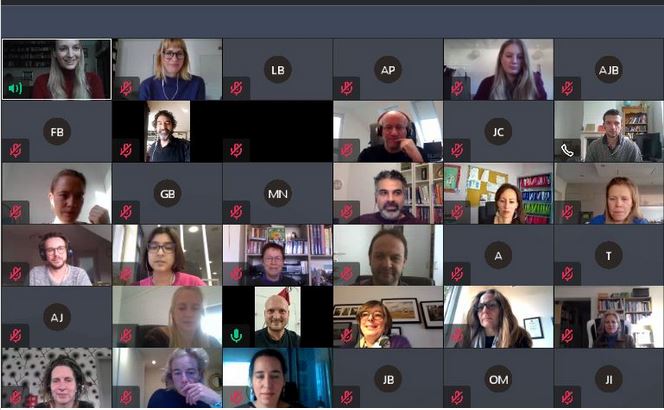
Paris, France, December 2020 – The Efus-led BRIDGE project (Building resilience to reduce polarisation and growing extremism) held online its third European seminar, which focused on “Responding to the vicious cycle of far right and religious extremist agitation: Lessons learned”, on 26 November.
Presented by BRIDGE expert and Islam scholar Götz Nordbruch, it gathered the members of the project’s consortium as well as other representatives of European municipalities, urban security actors and radicalisation prevention practitioners.
The seminar ended with the presentation of some useful tools and methods from one of BRIDGE’s sister ISF-P projects: CHAMPIONs.
Similarities between far-right and religious extremism
Götz Nordbruch emphasised that there are similarities between far-right and religious extremism. He referred to a study of the Institute for Democracy and Civil Society in Jena (Germany) that examined data collected in five democratic countries: results show that terrorist attacks committed by right-wing extremists over the past few years happened more or less at the same time as Jihadist terrorist attacks.
There are common features to both extremist world views, such as the “us and them” thinking, and the fact that group members define their identity as exclusively “a devout Muslim” or a “white supremacist/nationalist.” Furthermore, prominent narratives employed by right-wing extremists as well as by Jihadist groups include the portrayal of their respective group as victim of repression by government or “the elite”, and the denunciation of “leftist” media and the “liberal” or “anything goes” Western society.
Filling voids in the public discourse
Götz Nordbruch gave various examples of how the vicious cycle of extremist agitation is fuelled. Far-right and Jihadist violent extremists have been able to exploit voids in public discourse because moderate media, politicians and other relevant public figures have played down, or mischaracterized incidents, or failed to address underlying issues such as racism and islamophobia. One example is the murder of a Muslim woman in a courtroom in Dresden (Germany) by the racist defendant, against whom she was a co-plaintiff in a court case of hate speech, in July 2009. The following public debate focused solely on the issue of security in courtrooms and failed to mention the murderer’s racist and Islamophobic motive. Jihadist extremists used the case to spread extremist propaganda.
How to stop the vicious cycle of extremist agitation?
Götz Nordbruch presented examples and conclusions on how the vicious cycle of extremist agitation can be stopped or prevented. An important factor is how public discourse, notably via the media, presents facts and contexts. He said that when referring to a discourse or incident, it is crucial to mark it precisely, for example as a homophobic or racist hate speech/crime.
Another key factor is the reaction of government officials, who should promote inclusivity rather than confrontation as New Zealand Prime Minister Jacinda Ardern did after the Christchurch attacks in 2019.
Equally, an important aspect to emphasize is that we all have multiple identities, as opposed to the ‘purity’ put forth by extremists (i.e. a devout Muslim or a white supremacist and nothing else). Nordbruch gave the example of the Mayor of London Sadiq Khan who portrays himself as Muslim, European, Londoner, British, husband and so on. Claiming our multi-layered identity is a way of deconstructing polarisation.
Training the police, working with young people…
A roundtable discussion followed, during which participants emphasised the need to change the culture of police by providing adequate training to officers, sanctioning police misconduct, and improving relations with citizens.
They also stressed the importance of working with young people in order to distinguish between provocation, protest and hardened extremist propaganda.
… and addressing racism
Attendees pointed out the need to take into consideration young Muslims’ experiences with discrimination (e.g when they’re prevented from accessing public services because they wear a hijab). However, they all agreed that even though extremism persists, public discourse has become more open and inclusive in the past few years, which facilitates the prevention of violent radicalism.
Countering fake news
Participants agreed that local authorities have an important role to play in countering polarising rumours and fake news at the local level, which goes a long way to preventing or mitigating polarisation.
Exchange between sister projects – experience sharing
The last section of the seminar was dedicated to a presentation of the CHAMPIONs project, which seeks to prevent polarisation in the Central and Eastern European (CEE) region, and the tools they have designed to help local authorities do so. The expertise and experience exchange between the two projects are further facilitated by the fact that Efus is a member of CHAMPIONs Advisory Board.



